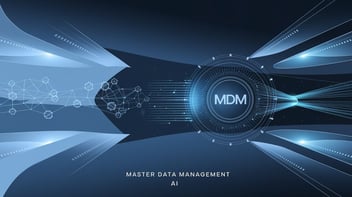
-
AI-powered anomaly detection– Automatically identifies discrepancies in master data, reducing errors before they affect business operations.
-
Machine Learning-driven data classification– Enhances metadata tagging, making it easier to search and retrieve accurate data.
-
Automated entity resolution– AI can detect duplicate records across multiple sources, ensuring better data consistency.
-
Real-time collaboration– Teams across different geographies can access and update data seamlessly.
-
Lower operational costs– Organizations save on infrastructure and maintenance expenses.
-
Built-in AI and analytics– Cloud-based MDM platforms often integrate AI-driven insights to improve data governance and quality control.
3. AI-Driven Data Governance: Strengthening Compliance & Security
-
Automated policy enforcement– AI-powered workflows ensure compliance with regulatory requirements in real time.
-
AI-driven data lineage tracking– Provides full visibility into how data moves across the organization. (Expert Insights)
-
Predictive risk management– AI analyzes patterns to detect potential security breaches before they happen.
4. Breaking Down Data Silos with AI-Powered Integration
-
Data Fabric Architecture– AI facilitates seamless integration across cloud, on-premises, and third-party systems.
-
Automated Data Mapping– AI dynamically maps structured and unstructured data sources, making data consolidation effortless.
-
Cross-Industry Data Exchange– Industries such as finance, healthcare, and retail are using AI to unify customer, product, and transactional data across multiple systems. (Fast Company)
5. Prioritizing Data Privacy & Security in MDM
-
AI-powered threat detection– Real-time monitoring identifies suspicious activities before breaches occur.
-
Automated access control– AI dynamically grants or restricts user access based on behavioral analysis.
-
Secure encryption & tokenization– Protects sensitive data without compromising accessibility.
-
Retail– AI enhances inventory management by unifying real-time customer demand data across multiple locations.
-
Healthcare– MDM solutions powered by AI ensure accurate patient records and compliance with HIPAA regulations.
-
Banking– AI strengthens fraud detection by identifying anomalies in financial transactions.
-
Pharmaceuticals– AI speeds up clinical trials by automating drug development data management. (Business Insider)

Posted by PDI Marketing Team
Pacific Data Integrators Offers Unique Data Solutions Leveraging AI/ML, Large Language Models (Open AI: GPT-4, Meta: Llama2, Databricks: Dolly), Cloud, Data Management and Analytics Technologies, Helping Leading Organizations Solve Their Critical Business Challenges, Drive Data Driven Insights, Improve Decision-Making, and Achieve Business Objectives.




